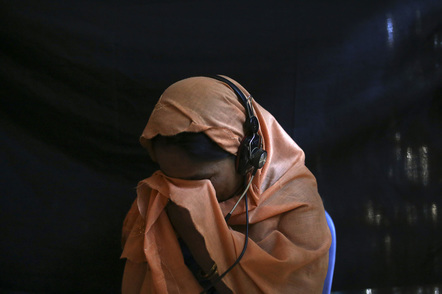 Rahana cries as she talks with traffickers from an Internet hut in Thae Chaung village on January 29, 2015. Rahana, a 32-year-old Rohingya, has already sent $1,100 to the trafficker who is holding her 12-year-old son ransom at a camp along the Thailand-Malaysia border. The trafficker wants another $300 before he will release the boy. "Let me speak to my son," Rahana tells the trafficker. A few seconds pass, then a small voice says, "Mum?" Rahana's eyes fill with tears. "I will send the money," she assures her son. "Then they will let you go. From http://www.theatlantic.com/photo/2015/03/reunions-and-ransoms-in-burma-digital-connections-among-the-rohingya/386492/ Rahana cries as she talks with traffickers from an Internet hut in Thae Chaung village on January 29, 2015. Rahana, a 32-year-old Rohingya, has already sent $1,100 to the trafficker who is holding her 12-year-old son ransom at a camp along the Thailand-Malaysia border. The trafficker wants another $300 before he will release the boy. "Let me speak to my son," Rahana tells the trafficker. A few seconds pass, then a small voice says, "Mum?" Rahana's eyes fill with tears. "I will send the money," she assures her son. "Then they will let you go. From http://www.theatlantic.com/photo/2015/03/reunions-and-ransoms-in-burma-digital-connections-among-the-rohingya/386492/ A student wrote to me today about my essay called Buddhism and Social Justice. Here is my slightly edited reply: Thank you for your query and for reminding me of this essay; I had some help with writing it (from a monk) and for a reason I don’t understand he is not acknowledged (I think he did some of the footnotes). I am not a monk, nor a religious teacher. But I would say there are many examples of how a “contemporary, partial understanding of karma can lead to social inequality and injustice”. Karma is something which at one level seems easy (cause and effect) but on the other hand is really hard to understand; if the teachings are true this may be in part because some causes and some effects are hidden in past and future lives. in Myanmar at the moment, the dominant and more powerful, ostensibly “Buddhist” majority is largely treating the Rohingya population (a Muslim minority) with fear and hatred (including by discriminating against them in the recent floods). As an example, my understanding of karma is that this fear and hatred of the Rohingya especially if translating to action (eg discrimination or even murder) could create the cause (for example) to be born as a Rohingya in Myanmar. (I was taught that actions have 4 steps to be complete – to think, to speak, to do and not to regret; eg if I think of hurting someone (or stealing something) that is bad but not as bad as speaking about it, but speaking of it is not as bad as doing it and doing it is not as bad as rejoicing in it (eg see). Some conceptualisations of karma are that someone who is despised or in other ways treated badly “deserves” this because of their past behaviour (eg maybe in Hinduism, as a justification for treating an animal or an “untouchable” badly). I believe that is itself wrong, generating the cause to experience unpleasant results, eg to be born as an animal or “outcaste”. Now, in Australia, we lock murderers away, we do punish them. This is because of the actions of the murderer (in this life). But if we treat a child badly, claiming that their actions in their past life merit this, then we are creating the cause to ourselves be treated badly. If a Rohingya did something such as burn a house down they should be prosecuted. But I think in Myanmar it has reached the stage where there are a lot of atrocities, on both sides, and few if any prosecutions. It is more that the Buddhist majority have collectively decided to punish the Rohingya minority. 2. “Karmic determinism” sounds to me like this false view (false as I was taught). For example, take myself (or take you, or your friend). We might have done something wrong, in this life or the last, and thus have caused a poor outcome. But, if, from this moment on, we strive to practice good thoughts, to generate good karma, then our minds can change, and so can our destiny. Our karma is not “predetermined” but changeable. Without this chance, life would be very unfair indeed. Nor do I think we have to die before we experience karma ripening (for good or bad). 3. To what extent do you believe the contemporary understanding of karma is used to justify social inequality and injustice? I think it can be – I think for example in India there is a lot of blaming of the poor – also however in rich countries, and now in Australia to an extent. Many people in the US believe that the poor “deserve” to be poor because they are stupid or lazy. In fact, many of them are born to poor families. If the wealthy work to improve social justice then the conditions of the poor can be improved. If I call someone a “dole bludger” it implies that I think they are cheating, not trying; they may not deserve opportunities. Most Australians would not use the language of karma about the poor, but they do use language about “earning” or “deserving”. It is not very different. 4. How is this misunderstanding of this religious teaching impacting on those societies in which the belief is prevalent? One effect, I think is that where this belief is present there would be a lot of materialism, which does not lead to deep fulfilment.
1 Comment
|
AuthorColin Butler
|